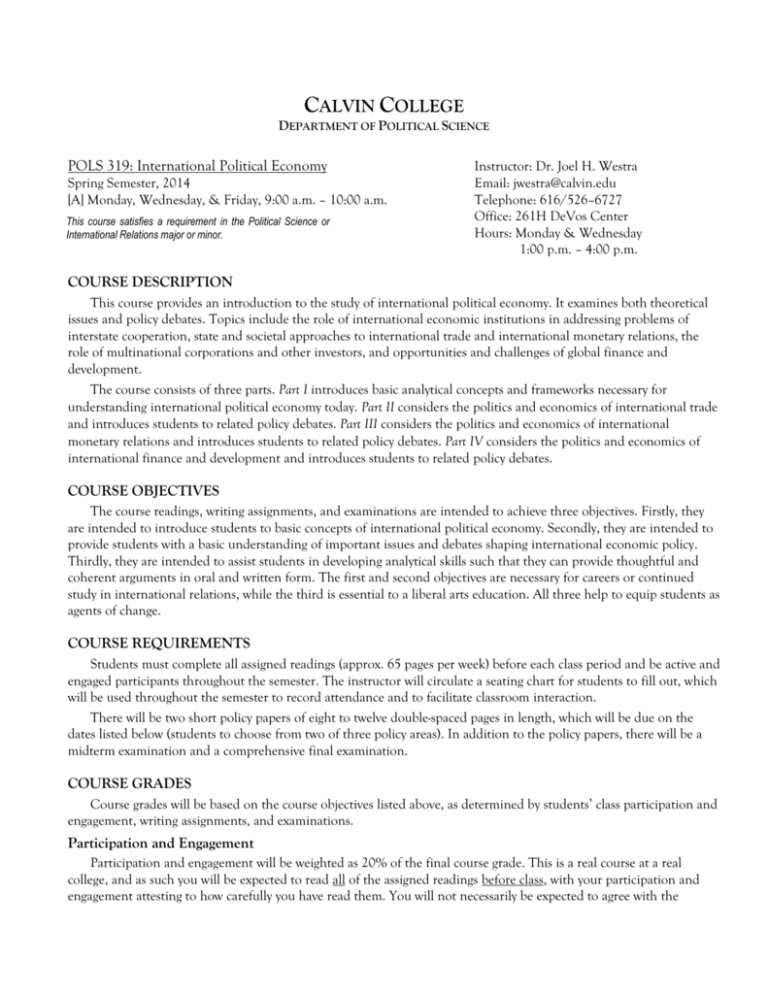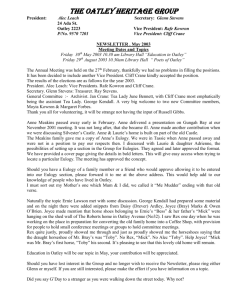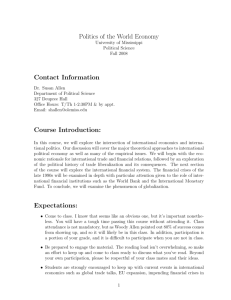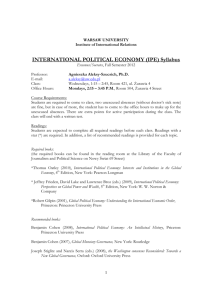
CALVIN COLLEGE
DEPARTMENT OF POLITICAL SCIENCE
POLS 319: International Political Economy
Spring Semester, 2014
[A] Monday, Wednesday, & Friday, 9:00 a.m. – 10:00 a.m.
This course satisfies a requirement in the Political Science or
International Relations major or minor.
Instructor: Dr. Joel H. Westra
Email: jwestra@calvin.edu
Telephone: 616/526–6727
Office: 261H DeVos Center
Hours: Monday & Wednesday
1:00 p.m. – 4:00 p.m.
COURSE DESCRIPTION
This course provides an introduction to the study of international political economy. It examines both theoretical
issues and policy debates. Topics include the role of international economic institutions in addressing problems of
interstate cooperation, state and societal approaches to international trade and international monetary relations, the
role of multinational corporations and other investors, and opportunities and challenges of global finance and
development.
The course consists of three parts. Part I introduces basic analytical concepts and frameworks necessary for
understanding international political economy today. Part II considers the politics and economics of international trade
and introduces students to related policy debates. Part III considers the politics and economics of international
monetary relations and introduces students to related policy debates. Part IV considers the politics and economics of
international finance and development and introduces students to related policy debates.
COURSE OBJECTIVES
The course readings, writing assignments, and examinations are intended to achieve three objectives. Firstly, they
are intended to introduce students to basic concepts of international political economy. Secondly, they are intended to
provide students with a basic understanding of important issues and debates shaping international economic policy.
Thirdly, they are intended to assist students in developing analytical skills such that they can provide thoughtful and
coherent arguments in oral and written form. The first and second objectives are necessary for careers or continued
study in international relations, while the third is essential to a liberal arts education. All three help to equip students as
agents of change.
COURSE REQUIREMENTS
Students must complete all assigned readings (approx. 65 pages per week) before each class period and be active and
engaged participants throughout the semester. The instructor will circulate a seating chart for students to fill out, which
will be used throughout the semester to record attendance and to facilitate classroom interaction.
There will be two short policy papers of eight to twelve double-spaced pages in length, which will be due on the
dates listed below (students to choose from two of three policy areas). In addition to the policy papers, there will be a
midterm examination and a comprehensive final examination.
COURSE GRADES
Course grades will be based on the course objectives listed above, as determined by students’ class participation and
engagement, writing assignments, and examinations.
Participation and Engagement
Participation and engagement will be weighted as 20% of the final course grade. This is a real course at a real
college, and as such you will be expected to read all of the assigned readings before class, with your participation and
engagement attesting to how carefully you have read them. You will not necessarily be expected to agree with the
readings, your fellow students, or the instructor, but you will be expected to be engaged participants, so as to learn from
the lecture and discussion each day. In doing so, you will become part of an ongoing conversation.
Your participation and engagement grade will be based on your contribution to that conversation. More than
simply engaging in classroom “chatter”, making a meaningful contribution to the conversation will require that you
arrive in class (and/or come to office hours) prepared to give an account of what you understand from the course
readings and discussion and what you do not understand. There is no excuse for having nothing to say; learning
requires preparation. If necessary, the instructor will call upon students who do not participate in class or demonstrate
engagement with the course material in other ways (such as through email, office hours, etc.)
Ideally, students would be so motivated by the intensity of the readings and the perspicacity of the instructor that
attendance would not need to be required. But because these are not ideal times, attendance will be included in
assessing class participation and engagement. Every student will be allowed three unexcused absences (i.e. one full week),
after which a penalty of 5% per day will be deducted from the final course grade. Please see the instructor as soon as
possible if you know in advance of an absence due to an extracurricular activity or other excusable reason (at the
instructor’s discretion; documentation may be required). Other than illness, most absences will not be excused, so plan
accordingly.
Students are permitted to use portable electronic devices in class, provided such devices are used for course
purposes and that their use does not undermine the participation and engagement of the user or other students.
Writing Assignments
The two policy papers each will be weighted as 20% of the final course grade. The instructor will distribute the
writing assignments in advance, as well as an analytic writing handout intended to help students avoid basic mistakes.
Students must follow the stylistic guidelines contained in the APSA Style Manual for Political Science (2006), available
online from https://www.apsanet.org/media/PDFs/Publications/APSAStyleManual2006.pdf. See pages 17–21 for in-text
citation guidelines and pages 24–33 for reference (i.e. works cited) guidelines. These guidelines are based on the Chicago
Manual of Style (15th edition).
Papers will be due on the dates listed below. Students must submit both printed and electronic versions of all
papers. Printed and electronic versions must match exactly. Papers must be submitted in a serif font (such as Times
New Roman) of size 11 or 12 with 1” margins on all sides. The filename of the electronic version must include the
name of the student submitting it. The instructor may assess a 0.25 grade point penalty (each instance) for failure to
follow these instructions.
Grades will be based on analytical rigor, writing skill, and empirical evidence. Grades will be determined as follows.
A Excellent; Clear, thorough, and well-supported
A– Very good, with few shortcomings; or
Clear, but incomplete
B+ Generally clear, but some gaps; or
Good, though somewhat unclear
B Gaps in logic and evidence; or
Disordered; or Undeveloped
B– Multiple gaps and unclear parts; or
Containing contradictions
C+ Unclear throughout; or Wrong question
C Vague and unsupported
C– Very unclear and confusing; or
No argument
D+ Unclear and misunderstood; or
Incorrect/missing citations throughout
D Very poor
D– Extremely poor
F
Insufficient effort; or Dishonesty
The instructor will not accept late papers in the absence of a medical or other substantive excuse. Students seeking
to submit a late paper must contact the instructor before the deadline and may be required to provide documentation
and/or accept a grade reduction. Papers submitted electronically before the deadline will not be counted as late,
provided that a printed version is submitted to the instructor’s office within 24 hours. The instructor will only grade
papers submitted both electronically and in hard copy. DIXI.
2
If you need help with finding appropriate library resources, please schedule an appointment with Linda McFadden,
Reference Librarian (email: lmm8@calvin.edu, phone: x6–8455) or stop by the Research Assistance Desk at the
Hekman Library, which is staffed by a research librarian from 9:00 a.m. until 10:00 p.m. weekdays.
Examinations
The mid-term and final examinations will be weighted as 15% and 25% of the final course grade, respectively. Both
examinations will consist primarily of short answer questions and will be given on the dates noted below. The mid-term
examination is intended to provide feedback on how well students understand basic course concepts, while the final
examination is intended to assess students’ mastery of course concepts and their application to international politics.
Students may opt to take an oral final examination, which will cover a narrower range of topics in greater depth than
the written examination will.
The instructor will not administer makeup exams in the absence of a medical or other substantive excuse. Students
seeking to excuse a missed exam should contact the instructor as soon as possible and may be required to provide
appropriate documentation and/or accept a grade reduction. No early exams will be given, except as required for
extracurricular activities. The instructor will distribute handouts throughout the semester, which together with the
syllabus will help students to prepare for the examinations.
ACADEMIC HONESTY
The student–faculty relationship is based on trust and mutual respect, which can be seriously undermined by the
suspicion or reality of academic dishonesty. If you are in doubt about whether some form of assistance or use of
materials constitutes academic dishonesty, please see the instructor. In general, the instructor expects that students will
adhere to the following guidelines.
1. Students will not take words from any source without putting quotation marks around such words and
giving credit to the source. This includes sentences and phrases, as well as significant single words, such as
those that express opinion or judgment.
2. Students will not take findings, concepts, or ideas from any source without giving credit to the source. In
paraphrasing, students will not use words so close to those contained in the source that, if a student’s work
were placed next to the source, it would be obvious that the student could not have written what s/he did
except by borrowing directly from the source with only superficial changes.
3. Students will organize their thoughts and ideas according to a plan of their own creation and will not
simply appropriate the plan of organization contained within another source. To the extent that a student’s
plan of organization is based upon another source, s/he will give credit to that source.
4. Students will neither ask nor allow someone else to write, revise, or otherwise modify their work in any way,
nor reuse papers submitted in other courses or written by other students.
Any violation of these guidelines and/or other rules contained within the Student Conduct Guide will result in an F
for the assignment and/or other appropriate disciplinary action, at the instructor’s discretion.
STUDENTS WITH DISABILITIES
The college will make reasonable accommodation for students with documented disabilities. Students seeking
accommodation should notify both the instructor and Coordinator of Services to Students with Disabilities (Hiemenga
Hall 455) within the first two weeks of the semester and make appropriate arrangements.
3
REQUIRED TEXTS
The following are required texts for this course and are available for purchase at the bookstore.
Gilpin, Robert. 2001. Global Political Economy: Understanding the International Economic Order. Princeton, NJ: Princeton
University Press.
Oatley, Thomas. 2011. International Political Economy: Interests and Institutions in the Global Economy. 5th ed. New York:
Pearson Longman.
In addition, you may wish to purchase the following text, also available at the bookstore. This text contains some of
the readings for Part I of the course, although these reading are also available online.
Lipson, Charles, and Benjamin J. Cohen, eds. 1999. Theory and Structure in International Political Economy. Cambridge,
MA: MIT Press.
Other supplemental journal articles and book sections are available online as noted in the syllabus. Access to certain
websites is available only via a Calvin College internet connection. The instructor will distribute supplemental news
articles throughout the semester as well as instructions for finding online journal articles.
COURSE READINGS
[Please note the page numbers listed below, as only selected pages of certain articles or book sections are assigned.]
February 3 – Introduction and Course Overview
Gilpin, Robert. 2001. “The Nature of Political Economy” and “Comparison of Economics and Political Economy.” In Global
Political Economy. Read pages 25–31, 38–41, and 74–76.
Oatley, Thomas. 2011. “What Is International Political Economy?” In International Political Economy. Read pages 2–7.
Part I: Analytical Frameworks
February 5, 7 – Neo-Classical Economics, Its Limits and Its Critics
Gilpin, Robert. 2001. “The Neoclassical Conception of the Economy.” In Global Political Economy. Read pages 46–69.
Oatley, Thomas. 2011. “Traditional Schools of International Political Economy.” In International Political Economy. Read pages 8–12.
February 10, 12 – Anarchy, Uncertainty, and Incomplete Information
Stein, Arthur A. 1982. “Coordination and Collaboration: Regimes in an Anarchic World.” International Organization 36(2). Read
pages 301–319. Available online from JSTOR.
Oatley, Thomas. 2011. “Interests and Institutions in International Political Economy” and “The Global Economy in Historical
Context.” In International Political Economy. Read pages 13–19.
February 14 – States as Non-Unitary Actors
Putnam, Robert D. 1988. “The Logic of Two-Level Games.” International Organization 42(3). Read pages 427–430 and 434–450.
Available online from JSTOR. [or Lipson/Cohen, pp. 347–350 and 354–370]
February 17 – Externalities, Public Goods, and Social Cost
Olson, Mancur. 1965. “A Theory of Groups and Organizations.” In The Logic of Collective Action. Read pages 8–16 and 33–36.
Available online from Moodle.
Coase, Ronald. 1960. “The Problem of Social Cost.” Journal of Law and Economics 3. Read page 1–8 and 15–19. Available online
from JSTOR.
4
February 19, 21 – Hegemony and International Institutions
Axelrod, Robert, and Robert O. Keohane. 1985. “Achieving Cooperation under Anarchy.” World Politics 38(1): 226–254. Available
online from JSTOR.
Gilpin, Robert. 2001. “The Politics of International Regimes.” In Global Political Economy. Read pages 82–93.
February 24 – Distribution and the Problem of Relative Gains
Gilpin, Robert. 2001. “Distribution of Wealth and Economic Activities” and “National Autonomy.” In Global Political Economy.
Read pages 78–82.
Grieco, Joseph M. 1988. “Anarchy and the Limits of Cooperation.” International Organization 42(4). Read pages 492–501. Available
online from JSTOR. [or Lipson/Cohen, pp. 16–25]
February 26 – Power, Interdependence, and Bargaining
Krasner, Stephen D. 1991. “Global Communications and National Power: Life on the Pareto Frontier.” World Politics 43(3). Read
pages 336–342. Available online from JSTOR.
Keohane, Robert O., and Joseph S. Nye. 1989. Power and Interdependence. Read pages 8–19. Available online from Moodle.
February 28, March 3 – National Systems of Political Economy
Gilpin, Robert. 2001. “National Governments and Domestic Economies” and “National Systems of Political Economy.” In Global
Political Economy. Read pages 129–130, 148–155, 156–164, and 168–171.
Putnam, Robert D. 1988. “The Logic of Two-Level Games.” Reread pages 440–441 and 448–450. [or Lipson/Cohen, pp. 360–361 and
368–370]
March 5 – MID-TERM EXAMINATION
Part II: International Trade
March 7 – The Economics of International Trade
Oatley, Thomas. 2011. “The Economic Case for Trade.” In International Political Economy. Read pages 46–53.
March 10 – The Economics of International Trade (cont’d)
Gilpin, Robert. 2001. “Revisions of Conventional Trade Theory.” In Global Political Economy. Read pages 206–210.
March 12, 14 –Power, Preferences, and the Structure of International Trade
Gilpin, Robert. 2001. “Embeddedness of the Economy” and “Theory of Hegemonic Stability.” In Global Political Economy. Read
pages 41–45 and 93–102.
Krasner, Stephen D. 1976. “State Power and the Structure of International Trade.” World Politics 28(3). Read pages 318–323 and
341–343. Available online from JSTOR.
Oatley, Thomas. 2011. “Hegemons, Public Goods, and the World Trade System.” In International Political Economy. Read pages 28–
32.
March 17 – The GATT/WTO Trading System
Gilpin, Robert. 2001. “Postwar Trade Regime.” In Global Political Economy. Read pages 217–224.
Oatley, Thomas. 2011. “The World Trade Organization and the World Trade System,” “The Political Economy of International
Trade Cooperation,” and “Organizing Interests.” In International Political Economy. Read pages 21–28, 53–67, and 79–80.
[TOPICS FOR POLICY PAPER #1 (OPTIONAL) ARE DUE BY THE BEGINNING OF THE CLASS PERIOD.]
5
March 19 – Political Cleavages, Sectoral Conflict, and Trade Preferences
Oatley, Thomas. 2011. “Trade Policy Preferences.” In International Political Economy. Read pages 70–79.
Rogowski, Ronald. 1987. “Political Cleavages and Changing Exposure to Trade.” American Political Science Review 81(4). Read pages
1122–1127. Available online from JSTOR.
March 21 – Political Cleavages, Sectoral Conflict, and Trade Preferences (cont’d)
Rogowski, Ronald. 1987. “Political Cleavages and Changing Exposure to Trade.” Read pages 1132–1133. [see above]
Oatley, Thomas. 2011. “A Society-Centered Approach to Trade Politics.” In International Political Economy. Read pages 79–87.
March 24, 26, 28 – SPRING BREAK
March 31, April 2 – Industrialization, Import Substitution, and Protectionism
Gilpin, Robert. 2001. “The Debate over Free Trade” and “The Rise and Demise of Development Economics.” In Global Political
Economy. Read pages 198–202 and 306–312.
Oatley, Thomas. 2011. “States and Industrial Policy,” “Import Substitution Industrialization,” and “Economic Reform.” In
International Political Economy. Read pages 90–95, 112–130, and 134–144.
April 4 – Dominance, State Power, and Strategic Trade Theory
Gilpin, Robert. 2001. “Strategic Trade Theory” and “From Comparative to Competitive Advantage.” In Global Political Economy.
Read pages 122–127 and 210–214.
Oatley, Thomas. 2011. “The Political Foundation of Industrial Policy” and “Industrial Policy in High-Technology Industries.” In
International Political Economy. Read pages 95–103.
April 7 – Competitiveness, Relative Gains, and Strategic Rivalry
Oatley, Thomas. 2011. “Strategic Rivalry in Semiconductors and Commercial Aircraft.” In International Political Economy. Read pages
103–107.
Gilpin, Robert. 2001. “Do Nations Compete with One Another?” and “Trade and the Economy.” In Global Political Economy. Read
pages 180–183 and 202–206.
Mastanduno, Michael. 1991. “Do Relative Gains Matter?” International Security 16(1). Read pages 73–75 and 110–113. Available
online from JSTOR.
April 9 – Regionalism and Other Challenges to the GATT/WTO System
Oatley, Thomas. 2011. “New Directions, New Challenges,” “Regional Trade Arrangements,” and “Developing Countries and the
WTO.” In International Political Economy. Read pages 32–43 and 154–156.
Gilpin, Robert. 2001. “New Threats to an Open Trading System.” In Global Political Economy. Read pages 224–232.
Part III: International Monetary Relations
April 11, 14 – The Economics of International Monetary Relations
Oatley, Thomas. 2011. “The Economics of the International Monetary System.” In International Political Economy. Read pages 203–
212.
Gilpin, Robert. 2001. “Embedded Technical and Political Issues” and “Devising an International Monetary System.” In Global
Political Economy. Read pages 242–250.
[POLICY PAPER #1 (OPTIONAL) DUE AT THE BEGINNING OF THE CLASS PERIOD ON APRIL 14.]
6
April 16 – The Rise, Decline, and Fall of the Bretton Woods System
Oatley, Thomas. 2011. “The Rise and Fall of the Bretton Woods System.” In International Political Economy. Read pages 212–223.
Gilpin, Robert. 2001. “The Postwar International Monetary System” and “The End of Fixed Exchange Rates.” In Global Political
Economy. Read pages 235–239.
[TOPICS FOR POLICY PAPER #2 (OPTIONAL) ARE DUE BY THE BEGINNING OF THE CLASS PERIOD.]
April 18, 21 – EASTER BREAK
April 23 – Post-Bretton Woods Monetary Arrangements and the Changing Role of the IMF
Oatley, Thomas. 2011. “The Contemporary International Monetary System.” In International Political Economy. Read pages 226–248.
Gilpin, Robert. 2001. “The Financial Revolution and Monetary Affairs,” “Reform of International Monetary Affairs,” and “Unity or
Fragmentation of the Monetary System?” In Global Political Economy. Read pages 239–242 and 250–258.
April 25 – Monetary Policy and Exchange Rate Stability
Oatley, Thomas. 2011. “Monetary and Exchange-Rate Policies.” In International Political Economy. Read pages 250–255 and 274–297.
April 28 – Monetary Policy, Exchange Rate Stability, and Domestic Politics
Oatley, Thomas. 2011. “Society-Based Models of Monetary and Exchange-Rate Policies.” In International Political Economy. Read
pages 255–272.
April 30 – ACADEMIC ADVISING
Part IV: Global Finance, Investment, and Development
May 2 – The Debt Crisis, IMF Conditionality, and Structural Adjustment
Gilpin, Robert. 2001. “The Debt Crisis and Structural Adjustment.” In Global Political Economy. Read pages 313–316.
Oatley, Thomas. 2011. “Structural Adjustment and the Politics of Reform,” “The Latin American Debt Crisis,” and “The Heavily
Indebted Poor Countries.” In International Political Economy. Read pages 145–154, 299–320, and 338–344.
May 5 – Financial Crises, the Changing Role of the IMF, and the Rise of the G-20
Gilpin, Robert. 2001. “The International Financial System.” In Global Political Economy. Read pages 261–277.
Oatley, Thomas. 2011. “A Decade of Crises.” In International Political Economy. Read pages 324–338.
[TOPICS FOR POLICY PAPER #3 (OPTIONAL) ARE DUE BY THE BEGINNING OF THE CLASS PERIOD.]
May 7 – Capital Controls and Other Tools of Financial Management
Goodman, John B., and Louis W. Pauly. 1993. “The Obsolescence of Capital Controls?” World Politics 46(1). Read pages 50–60.
Available online from JSTOR.
Bhagwati, Jagdish. 1998. “The Capital Myth: The Difference between Trade in Widgets and Dollars.” Foreign Affairs 77(3): 7–12.
Available online from JSTOR.
Edwards, Sebastian. 1999. “A Capital Idea? Reconsidering a Financial Quick Fix.” Foreign Affairs 78(3): 18–22. Available online
from JSTOR.
[POLICY PAPER #2 (OPTIONAL) DUE AT THE BEGINNING OF THE CLASS PERIOD.]
7
May 9 – FDI and Multinational Corporations
Gilpin, Robert. 2001. “The State and the Multinationals.” In Global Political Economy. Read pages 278–294.
Oatley, Thomas. 2011. “Multinational Corporations in the Global Economy.” In International Political Economy. Read pages 159–
178.
May 12 – Environmental Degradation, Inequality, and the “Race to the Bottom”
Oatley, Thomas. 2011. “Globalization: Consequences and Controversies.” In International Political Economy. Read pages 347–368.
Gilpin, Robert. 2001. “Alleged Consequences of Economic Globalization” and “Debate over the MNC and the Nation-State.” In
Global Political Economy. Read pages 366–369 and 294–300.
May 14, 15 – Regulating Multinational Corporations
Gilpin, Robert. 2001. “The New Trade Agenda” and “The State and the Multinationals.” In Global Political Economy. Read pages
225–231 and 300–304.
Oatley, Thomas. 2011. “The Politics of Multinational Corporations.” In International Political Economy. Read pages 181–201.
May 19 – FINAL EXAMINATION [1:30 p.m. – 4:30 p.m.]
[POLICY PAPER #3 (OPTIONAL) DUE AT THE BEGINNING OF THE EXAMINATION PERIOD]
GAUDEAMUS
8






